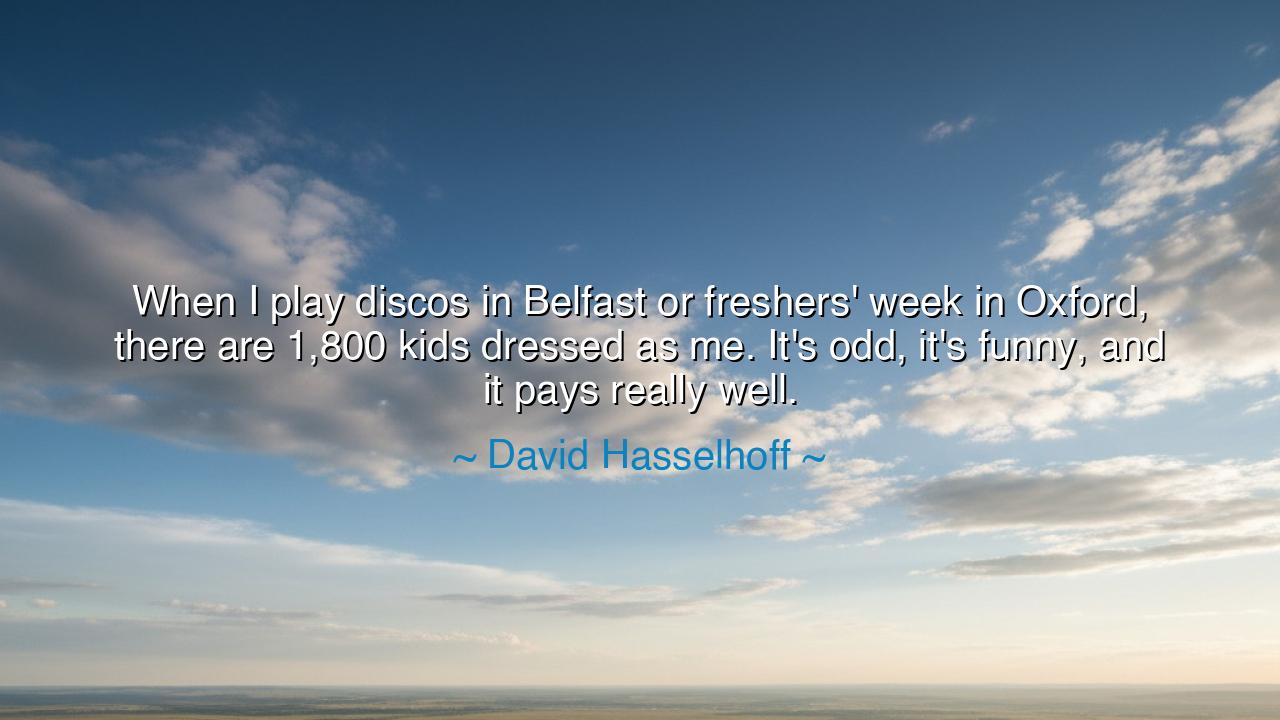
When I play discos in Belfast or freshers' week in Oxford, there
When I play discos in Belfast or freshers' week in Oxford, there are 1,800 kids dressed as me. It's odd, it's funny, and it pays really well.






Hear, O listeners of fame and folly, the words of David Hasselhoff, the knight of both beach and screen, who said: “When I play discos in Belfast or freshers' week in Oxford, there are 1,800 kids dressed as me. It’s odd, it’s funny, and it pays really well.” At first, his words seem like a jest—a lighthearted remark from a man long accustomed to the strange theater of celebrity. But beneath this laughter lies a profound reflection on identity, legacy, and the curious nature of admiration. For what Hasselhoff describes is not simply fame, but the transformation of self into symbol—when the person becomes myth, and the myth begins to dance without him.
In his words, there is both wonder and distance. “It’s odd,” he says, for it is indeed strange to see oneself multiplied into hundreds, even thousands, of imitations. It is “funny,” because such imitation, though flattering, also carries absurdity—the absurdity of the human desire to mirror what it adores. And yet, he concludes with pragmatic grace: “it pays really well.” Here is the full circle of modern myth-making: the star, born of genuine passion and work, becomes idol, costume, and commodity all at once. Hasselhoff stands in the middle of this paradox with laughter, not resentment, and in doing so, he reveals a rare wisdom: that to endure fame, one must learn to laugh at its illusions.
The ancients, too, knew this cycle well. Consider Alexander the Great, who, after conquering vast lands, found men in foreign cities carving statues of him as a god. He was not yet thirty, yet already immortalized in stone. Some say he wept, for he feared that he had become a legend before he had lived a life. So it is with Hasselhoff, though his empire is of a different kind. From Knight Rider to Baywatch, his image became a symbol of confidence, humor, and spectacle—a larger-than-life reflection of his own humanity. When he looks upon a sea of youths dressed as him, he sees the echo of that reflection. They are not mocking him, but celebrating the idea of him, the myth that he unwittingly created.
Yet in his acceptance of this spectacle—“it’s funny, and it pays really well”—there is no bitterness. He recognizes that fame, like any force of nature, cannot be controlled; it can only be ridden like a wave. And this, perhaps, is what separates the wise from the broken in the realm of celebrity. Many have drowned in the image of themselves—believing the reflection to be real. But Hasselhoff, in his self-awareness, stands above the illusion. He does not confuse the man with the myth; he acknowledges both and keeps his humor intact. Humility, cloaked in jest, is the secret he carries.
There is a lesson here for all who seek recognition or influence. When others imitate you, do not fear it—understand it. To be imitated is to have touched the collective imagination, to have created something that lives beyond you. Yet do not mistake that imitation for worship of the self; it is worship of what your image represents. The wise artist does not cling to that projection, nor does he despise it. He lets it exist freely, as Hasselhoff does, with gratitude and laughter. For fame, like fire, is a gift that warms when respected and burns when grasped too tightly.
Consider, too, the tale of Charlie Chaplin, who once entered a “Charlie Chaplin look-alike contest” and came in third place. The story, whether true or apocryphal, carries the same wisdom: once your image belongs to the world, it is no longer yours. Chaplin laughed, as Hasselhoff laughs, at the beautiful absurdity of fame. Both understood that to live joyfully in the shadow of your own myth is to remain human amidst worship. The ego that cannot laugh at itself will soon turn tragic; the heart that can will remain free.
Therefore, let this teaching be passed down to all who dream of greatness: seek not to be worshipped, but to be remembered with laughter and light. If your likeness is imitated, smile at it; if your name becomes costume, rejoice that it still brings joy. The true measure of legacy is not solemn reverence, but the warmth it leaves in others. Hasselhoff’s quote, though wrapped in humor, is the voice of one who has learned to stand at peace with his legend—to watch the world dance in his image and to laugh, knowing that it is not truly him they imitate, but the spirit he once embodied.
So, children of ambition, remember this: the world may one day mirror you in strange and distorted ways. Do not fear the reflection. Like David Hasselhoff, greet it with grace, humor, and humility. For to laugh at the illusion of yourself is to conquer the vanity that consumes so many. Fame will fade, images will pass, but laughter—laughter endures.






AAdministratorAdministrator
Welcome, honored guests. Please leave a comment, we will respond soon